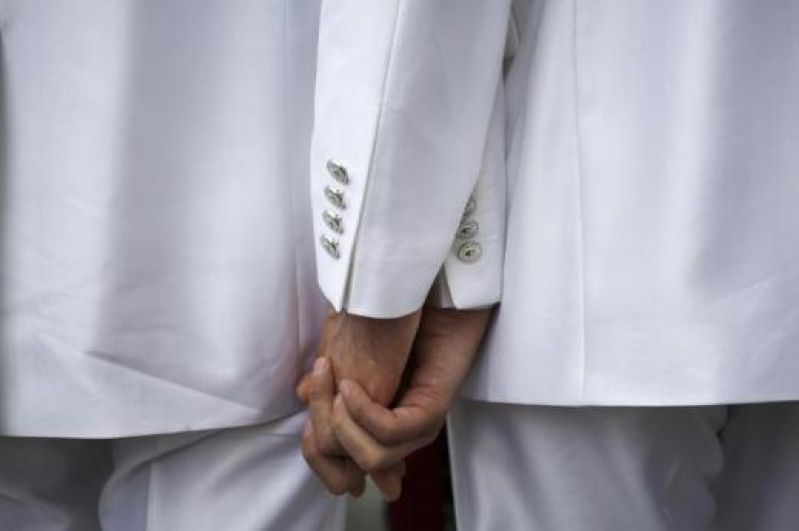
Missouri residents could vote in the near future whether to give increased legal protection to representatives of business, church and other religious entities if they decline to provide services for, or participate in, same-sex weddings. Sen. Bob Onder, R-Lake St. Louis, wants to put the question on the ballot this year in the form of a proposed constitutional amendment.
Onder's resolution is Senate Joint Resolution 39. Under the proposal, the state or any local government wouldn't be able to penalize, through fines or loss of any tax-exempt status, a religious group for declining to conduct or facilitate a same-sex marriage ceremony, reports the St. Louis Post-Dispatch.
Bakers or florists also would be shielded from government penalties if they chose not to sell to LGBT couples for their weddings.
Under Onder's resolution, schools, colleges, hospices, nursing homes, health care groups and other entities are considered religious organizations as long as their mission is in some way connected to a religion.
Onder states the bill would only apply to weddings and wedding services. He and his proponents said called the measure a "shield and not a sword." He also said the measure is in response to the 2015 U.S. Supreme Court ruling that made same-sex marriages legal nationwide.
"While this decision was very definitive with regard to the issue of same-sex marriage, it raised many more questions," Onder told the Senate Seniors, Family and Children Committee on Tuesday. "Important among those questions is: What are the rights of those who disagree, and specifically those of a religious faith?"
Sarah Rossi, director of advocacy and policy at the ACLU of Missouri, told the Post-Dispatch the ACLU believes churches shouldn't be required to hold same-sex marriages, but she reminded committee members that right is already guaranteed under the First Amendment.
"We don't think that clergy or churches should have to open their doors to lesbian and gay couples who want to get married," Rossi told the committee. But "denying access to buildings, denying access to bakeries, denying access to catering services - all of this goes too far."
One provision of the resolution indicates the state couldn't penalize religious organizations "act(ing) in accordance with a sincere religious belief concerning marriage between two persons of the same sex." Because there is no mention of an actual marriage ceremony in that provision, Rossi said the state could codify being able to deny service to the LGBT community in general.
However, Onder repeatedly has said the proposal only relates to weddings.
A Post-Dispatch reader, Emma Katz, stated online that if Onder is serious that his resolution is "only about weddings," then the legislation should say that. "Otherwise, he's either being duplicitous or demonstrating that he doesn't know how to draft legislation, even if it's not needed because churches already don't have to provide weddings for everyone. But either way, it seems like one more attempt to impose religious beliefs onto the law. A waste of taxpayer time and money if it is defeated, or if it is passed and then opposed in court (as it should be)."
However, a different reader, Joe Leicht said this proposal definitely should be made law. "The Supreme Court may have determined (outside its constitutional bound, BTW) that homosexuals have a 'right' to marry each other, but it did not rule that businesses or other organizations can be compelled to validate said 'marriages.'"
Onder said assertions that there is some blanket to deny service to people is utterly incorrect. "It's really a matter of people not being commandeered into being forced to participate in a ceremony that violates their religious beliefs."
Rossi said that because sexual orientation isn't included in the Missouri Human Rights Act, discrimination against gay people already is happening.
The Senate panel still needs to approve the resolution before it heads to the House floor.






